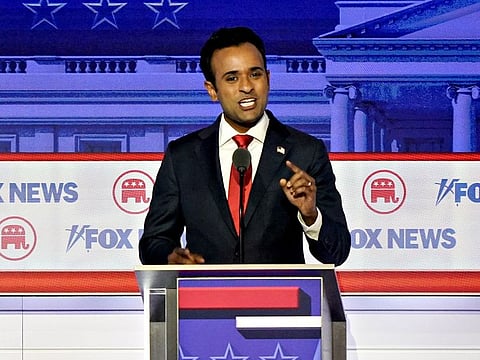Dissecting US Presidential campaign rhetoric
Candidates increasingly focus on attacking foreign entities to gain domestic support

As the US Presidential elections draw nearer, political candidates are actively crafting their agendas to present to prospective voters. Unlike the past, where real issues were thoroughly debated, recent times have witnessed a shift towards attacking foreign entities as a means to garner domestic support.
However, let us remember that a strong and honourable political discourse is built upon the pillars of factual information, well-reasoned agendas, and a commitment to decency that transcends sensationalism. As responsible citizens, we must not only demand but also expect a political dialogue firmly rooted in these principles, one that is worthy of our nation’s democratic ideals.
In the past decade, certain countries like Syria, Iran, and North Korea often found themselves at the centre of intense scrutiny by US presidential hopefuls. These candidates employed forceful language to publicly denounce these nations, attempting to sway voters to their side. However, it’s worth noting that these countries seem to have receded from the limelight of recent presidential campaigns. The evolution of campaign focus is a testament to the dynamic nature of American politics.
Also Read: The politics behind gun violence in the US
A profound responsibility
At the heart of any thriving democracy lies the need for an open and respectful dialogue, grounded in substantiated evidence rather than sensationalism.
It is essential to remind ourselves that political leaders bear a profound responsibility to the public — a responsibility that entails presenting arguments that are firmly grounded in reality, promoting mutual respect, and ultimately contributing to the betterment of society.
In the 2020 presidential campaign, Joe Biden, during a Democratic candidate’s debate, made a statement regarding his intent not to sell weapons to Saudi Arabia, asserting, “I would make it very clear we were not going to in fact sell more weapons to them.”
While this statement might have been intended to resonate with certain voters, it inadvertently cast a shadow over diplomatic relations and mutual understanding between the two nations.
The current political landscape also includes GOP candidate Vivek Ramaswamy, who has taken advantage of baseless allegations to further his campaign. In a recent CNN interview, Ramaswamy went so far as to claim that the US government had lied about the Sep. 11, 2001 terrorist attacks, stating, “Americans deserve the truth.”
Devoid of substance
He attempted to cast aspertions on Saudi Arabia. However, his claims are devoid of substantial evidence to support them. This trend of using unverified, biased assertions for personal political gain is indeed concerning and poses a serious threat to the integrity of the democratic process.
It’s worth noting that the 9/11 Commission Report, released on July 22, 2004, explicitly stated that there was no evidence of “official Saudi assistance” in the hijackers’ plot. This factual evidence directly contradicts the sweeping claims made by some political aspirants. The Commission’s findings highlight the indispensable importance of basing arguments on credible, well-documented information.
In today’s era, where information is abundant and easily accessible, it is the duty of voters to seek genuine and substantiated discourse, as opposed to being swayed by sensationalism and baseless allegations. As citizens, it is incumbent upon everyone to uphold the standards of political discourse that our nation so rightfully deserves.
In this pursuit, let us always remember that facts and decency, rather than slander and false accusations, must remain the guiding principles for politicians who seek the trust and support of the public. By adhering to these principles, we can ensure that our democracy remains vibrant, and that the society continues to be grounded in integrity and mutual understanding.
The Saudis have had enough of such people rising from obscurity and trying to malign the nation. This is slander at best. It may be the appropriate time to consider a counterattack with a lawsuit for slander against a nation and its people who have had enough.
— Tariq A. Al Maeena is a Saudi sociopolitical commentator. He lives in Jeddah, Saudi Arabia. Twitter: @talmaeena



